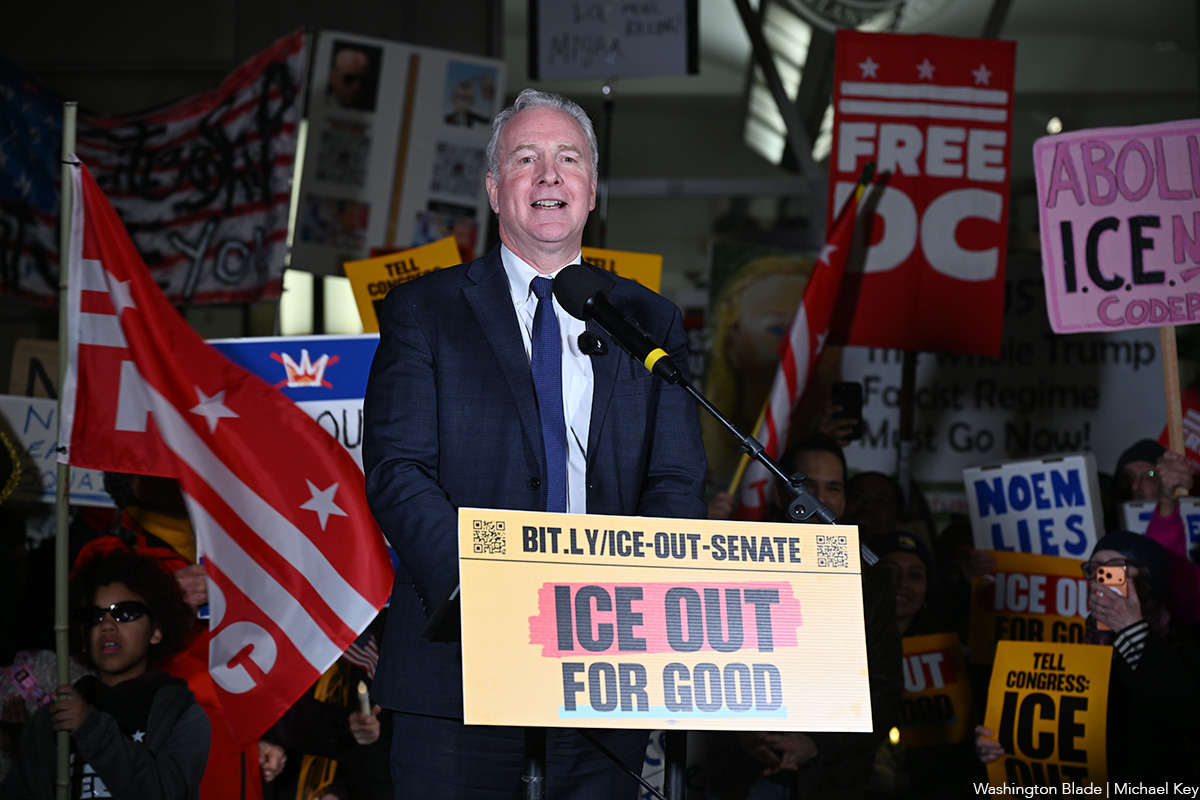Politics
Is a discharge petition ‘the only way’ to pass ENDA?
Gay lawyer who authored McCain-Feingold thinks so

Gay McCain-Feingold co-author Trevor Potter says a discharge petition is “the only way” to pass ENDA. (Photo courtesy of Caplin & Drysdale via Wikimedia Commons).
The gay co-author of the bipartisan campaign finance reform law known as McCain-Feingold says LGBT advocates could take a lesson from the way that measure passed into law — a discharge petition in the U.S. House — to advance the Employment Non-Discrimination Act.
Trevor Potter, a Republican attorney with Caplin & Drysdale who specializes in political law, told the Washington Blade on Tuesday that a discharge petition is “the only way” to get ENDA passed while Republicans remain in control of the House.
“Given the House GOP leader’s opposition to ENDA, and resulting refusal to schedule it for a floor vote, the ONLY way to get it passed in the House is by way of a discharge petition,” Potter said via email. “If the petition gets close to 218 signatures, then the leadership will negotiate.”
Asked whether those words should be considered an endorsement of a discharge petition, Potter replied, “I’m not in the business of endorsing strategies — just commenting on them and analyzing them. I’m just a lawyer, not a political strategist.”
Successful discharge petitions in Congress in rare, but some supporters of ENDA — most prominently the LGBT group Freedom to Work — are seeking a discharge petition as a way to get around the issue of House Republican leadership withholding a floor vote on ENDA.
If 218 lawmakers sign the petition, ENDA would come to the floor regardless of what House Speaker John Boehner (R-Ohio) and House Majority Leader Eric Cantor (R-Va.) have to say. That would mean in addition to the 178 sponsors of ENDA, 40 more lawmakers would have to sign the petition in the Republican-majority chamber.
The last successful discharge petition was in 2002: the House version of campaign finance legislation co-written by Potter that became known as the McCain-Feingold Bipartisan Campaign Reform Act.
In addition to co-writing that law, Potter has a distinctive history as an openly gay person in support of McCain. He served as general counsel to the Arizona senator’s 2008 and 2000 presidential campaigns.
Asked whether he could see McCain voting in favor of ENDA, Potter declined to answer.
“Like all good lawyers, I don’t comment on my clients,” he said.
Tico Almeida, president of Freedom to Work, said supporters of ENDA should take heed of Potter’s words as they look to pass the bill during the 113th Congress.
“Mr. Potter is way too modest,” Almeida said. “I understand that he basically co-wrote the McCain-Feingold legislation and was an author of the strategy to move it through both chambers of Congress. I’m impressed with the way they used the House ‘discharge petition’ to bring about the win on that legislation, and we should learn from their success as we push forward this year on ENDA.”
Still, Almeida cautioned against considering a discharge petition the “only way” to pass ENDA in the House and said other options are on the table.
“I don’t think a discharge petition is the only winning strategy, we might also choose to attach ENDA to another bill in the Senate, but the House discharge petition should definitely be on the table after we rack up a huge Senate vote total on ENDA this fall,” Almeida said. “If we all push hard, we could get to 60 Senate votes by September.”
Other LGBT groups and lawmakers who support ENDA aren’t overtly calling at this point for a discharge petition amid preparations for a full floor vote in the Senate in the months ahead.
Mara Keisling, executive director of the National Center for Transgender Equality, spoke broadly about supporting the right strategy to pass the bill when asked about the discharge petition.
“NCTE is interested in pursuing every possible option at the right time in the right way,” Keisling said.
Stacey Long, the National Gay & Lesbian Task Force director of public policy and government affairs, said the first matter at hand is success in the Senate before turning to the House.
“Our focus is building support for ENDA in the Senate and getting a floor vote done as soon as possible,”
Last week, Human Rights Campaign President Chad Griffin said he didn’t know whether a discharge petition would be appropriate for ENDA.
“I think as we get closer and as we make progress in the Senate, we’ll see, as we get closer, what the right strategies will be ultimately to get this done and work with the leadership, and work with Leader Reid and Chairman Harkin, who have been instrumental, and Sen. Merkley, who have been instrumental in getting us to where we are today,” Griffin said.
During the Netroots Nation conference in San Jose, Calif., last month, House Minority Leader Nancy Pelosi (D-Calif.) entertained the idea of a discharge petition to pass ENDA, but doubted the votes are there for passage.
“We can do discharge, but we don’t have enough votes to pass it,” Pelosi said. “So that means we have to have mobilization outside from some of our Republican friends, who should think that this is a form of discrimination that we should be getting rid of. But this is certainly the next order of business for us.”
And in an interview with the Blade in November, Rep. Jared Polis (D-Colo.), the gay lawmaker who’s the chief sponsor of ENDA in the House, said a discharge petition could be an option, but noted that legislation is rarely passed through that method.
“We can certainly file one,” Polis said. “Certainly in my time in Congress and long before it, there has never been a successful discharge petition … There certainly hasn’t been one in my time, or in the immediate past before my time.”
Congress
McBride, other US lawmakers travel to Denmark
Trump’s demand for Greenland’s annexation overshadowed trip

Delaware Congresswoman Sarah McBride is among the 11 members of Congress who traveled to Denmark over the past weekend amid President Donald Trump’s continued calls for the U.S. to take control of Greenland.
McBride, the first openly transgender person elected to Congress, traveled to Copenhagen, the Danish capital, with U.S. Sens. Chris Coons (D-Del.), Thom Tillis (R-N.C.), Jeanne Shaheen (D-N.H.), Dick Durbin (D-Ill.), and Lisa Murkowski (R-Alaska) and U.S. Reps. Steny Hoyer (D-Md.), Gregory Meeks (D-N.Y.), Madeleine Dean (D-Pa.), Don Bacon (R-Neb.), and Sarah Jacobs (D-Calif.). The lawmakers met with Danish Prime Minister Mette Frederiksen and Greenlandic MP Pipaluk Lynge, among others.
“I’m grateful to Sen. Coons for his leadership in bringing together a bipartisan, bicameral delegation to reaffirm our support in Congress for our NATO ally, Denmark,” said McBride in a press release that detailed the trip. “Delaware understands that our security and prosperity depend on strong partnerships rooted in mutual respect, sovereignty, and self-determination. At a time of growing global instability, this trip could not be more poignant.”
Greenland is a self-governing territory of Denmark with a population of less than 60,000 people. Trump maintains the U.S. needs to control the mineral-rich island in the Arctic Ocean between Europe and North America because of national security.
The Associated Press notes thousands of people on Saturday in Nuuk, the Greenlandic capital, protested against Trump. British Prime Minister Keir Starmer is among those who have criticized Trump over his suggestion the U.S. would impose tariffs against countries that do not support U.S. annexation of Greenland.
A poll that Sermitsiaq, a Greenlandic newspaper, and Berlingske, a Danish newspaper, commissioned last January indicates 85 percent do not want Greenland to become part of the U.S. The pro-independence Demokraatit party won parliamentary elections that took place on March 12, 2025.
“At this critical juncture for our countries, our message was clear as members of Congress: we value the U.S.-Denmark partnership, the NATO alliance, and the right of Greenlanders to self-determination,” said McBride on Sunday in a Facebook post that contained pictures of her and her fellow lawmakers meeting with their Danish and Greenlandic counterparts.
Congress
Van Hollen speaks at ‘ICE Out for Good’ protest in D.C.
ICE agent killed Renee Nicole Good in Minneapolis on Jan. 7

U.S. Sen. Chris Van Hollen (D-Md.) is among those who spoke at an “ICE Out for Good” protest that took place outside U.S. Customs and Border Protection’s headquarters in D.C. on Tuesday.
The protest took place six days after a U.S. Immigration and Customs Enforcement agent shot and killed Renee Nicole Good, a 37-year-old woman in Minneapolis.
Good left behind her wife and three children.
(Video by Michael K. Lavers)
Congress
Advocates say MTG bill threatens trans youth, families, and doctors
The “Protect Children’s Innocence” Act passed in the House

Georgia Congresswoman Marjorie Taylor Greene has a long history of targeting the transgender community as part of her political agenda. Now, after announcing her resignation from the U.S. House of Representatives, attempting to take away trans rights may be the last thing she does in her official capacity.
The proposed legislation, dubbed “Protect Children’s Innocence Act” is among the most extreme anti-trans measures to move through Congress. It would put doctors in jail for up to 10 years if they provide gender-affirming care to minors — including prescribing hormone replacement therapy to adolescents or puberty blockers to younger children. The bill also aims to halt gender-affirming surgeries for minors, though those procedures are rare.
Greene herself described the bill on X, saying if passed, “it would make it a Class C felony to trans a child under 18.”
According to KFF, a nonpartisan source for health policy research, polling, and journalism, 27 states have enacted policies limiting youth access to gender-affirming care. Roughly half of all trans youth ages 13–17 live in a state with such restrictions, and 24 states impose professional or legal penalties on health care practitioners who provide that care.
Greene has repeatedly introduced the bill since 2021, the year she entered Congress, but it failed to advance. Now, in exchange for her support for the National Defense Authorization Act, the legislation reached the House floor for the first time.
According to the 19th, U.S. Rep. Sarah McBride (D-Del.), the first trans member of Congress, rebuked Republicans on the Capitol steps Wednesday for advancing anti-trans legislation while allowing Affordable Care Act tax credits to expire — a move expected to raise health care costs for millions of Americans.
“They would rather have us focus in and debate a misunderstood and vulnerable one percent of the population, instead of focusing in on the fact that they are raiding everyone’s health care,” McBride said. “They are obsessed with trans people … they are consumed with this.”
Polling suggests the public largely opposes criminalizing gender-affirming care.
A recent survey by the Human Rights Campaign and Global Strategy Group found that 73 percent of voters in U.S. House battleground districts oppose laws that would jail doctors or parents for providing transition-related care. Additionally, 77 percent oppose forcing trans people off medically recommended medication. Nearly seven in 10 Americans said politicians are not informed enough to make decisions about medical care for trans youth.
The bill passed the House and now heads to the U.S. Senate for further consideration.
According to reporting by Erin Reed of Erin In The Morning, three Democrats — U.S. Reps. Henry Cuellar and Vicente Gonzalez of Texas and Don Davis of North Carolina — crossed party lines to vote in favor of the felony ban, joining 213 Republicans. A total of 207 Democrats voted against the bill, while three lawmakers from both parties abstained.
Advocates and lawmakers warned the bill is dangerous and unprecedented during a multi-organizational press call Tuesday. Leaders from the Human Rights Campaign and the Trevor Project joined U.S. Rep. Becca Balint (D-Vt.), Dr. Kenneth Haller, and parents of trans youth to discuss the potential impact of restrictive policies like Greene’s — particularly in contrast to President Donald Trump’s leniency toward certain criminals, with more than 1,500 pardons issued this year.
“Our MAGA GOP government has pardoned drug traffickers. They’ve pardoned people who tried to overthrow the government on January 6, but now they want to put pediatricians and parents into a jail cell for caring for their kids,” said Human Rights Campaign President Kelley Robinson. “No one asked for Marjorie Taylor Greene or Dan Crenshaw or any politician to be in their doctor’s office, and they should mind their own business.”
Balint, co-chair of the Congressional Equality Caucus, questioned why medical decisions are being made by lawmakers with no clinical expertise.
“Parents and doctors already have to worry about state laws banning care for their kids, and this bill would introduce the risk of federal criminal prosecution,” Balint said. “We’re talking about jail time. We’re talking about locking people up for basic medical care, care that is evidence-based, age-appropriate and life-saving.”
“These are decisions that should be made by doctors and parents and those kids that need this gender-affirming care, not certainly by Marjorie Taylor Greene.”
Haller, an emeritus professor of pediatrics at St. Louis University School of Medicine, described the legislation as rooted in ideology rather than medicine.
“It is not science, it is just blind ideology,” Haller said.
“The doctor tells you that as parents, as well as the doctor themselves, could be convicted of a felony and be sentenced up to 10 years in prison just for pursuing a course of action that will give your child their only chance for a happy and healthy future,” he added. “It is not in the state’s best interests, and certainly not in the interests of us, the citizens of this country, to interfere with medical decisions that people make about their own bodies and their own lives.”
Haller’s sentiment is echoed by doctors across the country.
The American Medical Association, the nation’s largest organization that represents doctors across the country in various parts of medicine has a longstanding support for gender-affirming care.
“The AMA supports public and private health insurance coverage for treatment of gender dysphoria and opposes the denial of health insurance based on sexual orientation or gender identity,” their website reads.
Rodrigo Heng-Lehtinen, senior vice president of public engagement campaigns at the Trevor Project, agreed.
“In Marjorie Taylor Greene’s bill [it] even goes so far as to criminalize and throw a parent in jail for this,” Heng-Lehtinen said. “Medical decisions should be between patients, families, and their doctors.”
Rachel Gonzalez, a parent of a transgender teen and LGBTQ advocate, said the bill would harm families trying to act in their children’s best interests.
“No politician should be in any doctor’s office or in our living room making private health care decisions — especially not Marjorie Taylor Greene,” Gonzalez said. “My daughter and no trans youth should ever be used as a political pawn.”
Other LGBTQ rights activists also condemned the legislation.
Tyler Hack, executive director of the Christopher Street Project, called the bill “an abominable attack on the transgender community.”
“Marjorie Taylor Greene’s last-ditch effort to bring her 3-times failed bill to a vote is an abominable attack on the transgender community and further cements a Congressional career defined by hate and bigotry,” they said. “We are counting down the days until she’s off Capitol Hill — but as the bill goes to the floor this week, our leaders must stand up one last time to her BS and protect the safety of queer kids and medical providers. Full stop.”
Hack added that “healthcare is a right, not a privilege” in the U.S., and this attack on trans healthcare is an attack on queer rights altogether.
“Marjorie Taylor Greene has no place in deciding what care is necessary,” Hack added. “This is another attempt to legislate trans and queer people out of existence while peddling an agenda rooted in pseudoscience and extremism.”
U.S. Rep. Mark Takano (D-Calif.), chair of the Congressional Equality Caucus, also denounced the legislation.
“This bill is the most extreme anti-transgender legislation to ever pass through the House of Representatives and a direct attack on the rights of parents to work with their children and their doctors to provide them with the medical care they need,” Takano said. “This bill is beyond cruel and its passage will forever be a stain on the institution of the United States Congress.”
The bill is unlikely to advance in the Senate, where it would need 60 votes to pass.
-

 Opinions5 days ago
Opinions5 days agoICE agents murder another American citizen in Minneapolis
-

 Books5 days ago
Books5 days ago‘The Director’ highlights film director who collaborated with Hitler
-

 LGBTQ Non-Profit Organizations4 days ago
LGBTQ Non-Profit Organizations4 days agoTask Force urges renewed organizing amid growing political threats
-

 Russia4 days ago
Russia4 days agoRussia designates ILGA World an ‘undesirable’ group


















